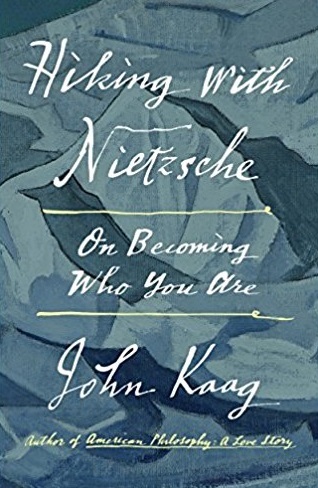
Hiking with Nietzsche: On Becoming Who You Are
by John Kaag
19 popular highlights from this book
Key Insights & Memorable Quotes
Below are the most popular and impactful highlights and quotes from Hiking with Nietzsche: On Becoming Who You Are:
“Walking is among the most life-affirming of human activities. It is the way we organize space and orient ourselves to the world at large. It is the living proof that repetition—placing one foot in front of the other—can in fact allow a person to make meaningful progress.”
“As it turns out, to ‘become who you are’ is not about finding a ‘who’ you have always been looking for. It is not about separating ‘you’ off from everything else. And it is not about existing as you truly ‘are’ for all time. The self does not lie passively in wait for us to discover it. Selfhood is made in the active, ongoing process, in the German verb werden, 'to become'.”
“Set for yourself goals, high and noble goals, and perish in pursuit of them!”
“All truly great thoughts,” Nietzsche informs his reader in The Twilight of the Idols, “are conceived while walking.”
“Marrying,” Schopenhauer tells us, “means to grasp blindfolded into a sack hoping to find an eel amongst an assembly of snakes.”
“If there was any meaning to life, it had to be found in suffering.”
“TO BE IGNORANT OF WHAT OCCURRED before you were born is to remain always a child.”
“Terror has its uses. The questions that scare us the most are precisely the ones that deserve our full and immediate attention.”
“When one’s life is completely controlled by powerful masters, the discipline of self-denial gives a slave something to do on his own terms. Indeed, it becomes the one thing a slave accomplishes on his own behalf. The slave has few options at his disposal: he can will nothing and be wholly controlled by his master, or he can set his will in motion in the ongoing process of self-negation. The slave has a choice between nonaction, which would eventually bring about his demise, and action, willful but self-abnegating, which would hasten this eventuality. Nietzsche thinks the decision is all too obvious: humans would rather destroy themselves than embody the passivity of willing nothing at all.”
“Become what you are”:”
“Either suffering is the meaning of life, or there is no meaning of life.”
“When one spends time reading—and falls in love with—a particular philosopher, he gradually begins to confuse the world of objective fact with an imagined one of ideals and beliefs.”
“I smiled for the camera. A grinning domesticated animal. By the time we reached the bottom, the picture would have been posted to Facebook and “liked” dozens of times. I’d be expected to “like” the “likes”, and the friendship of sheep would continue unabated.”
“I try to remember the shepherd-ferryman, to eat cheese between meals, and to do my best to become rather than to obsessively seek and control.”
“Being a responsible adult is, among other things, often to resign oneself to a life that falls radically short of the expectations and potentialities that one had or, indeed, still has. It is to become what one has always hoped to avoid.”
“In the philological community the publishing of The Birth of Tragedy in 1872 had created a rift between the literalists and the existentialists. The literalists held that the point of studying the origins of language was to “get it right”—to cut through the limits of interpretation in order to grasp the meaning of words as the ancients once understood them. Nietzsche, and a small band of existential philologists, held that this sort of intellectual time travel was both anachronistic and impossible—that the “task of the philologist is that of understanding his own age better by means of the classical world.” The point of historical study was to enrich the present moment of experience.”
“Traditional religious routes to salvation had been cut off in the early decades of the nineteenth century: German “higher criticism,” a form of biblical scholarship that read the Gospels as historical documents rather than the word of God, undermined the Church’s spiritual and existential authority; contemporary capitalism hit its stride, replacing the cross with the almighty dollar sign; and modern science—epitomized by Darwin’s discoveries in the middle of the century—only further eroded religious faith. One could have faith—and experience moments of deep, nearly divine meaning—but only in the tangible, observable flow of existence.”
“It is only as an aesthetic experience,” Nietzsche insists in The Birth of Tragedy, “that existence and the world are eternally justified.”
“It is not in our hands,” Nietzsche writes in The Twilight of the Idols, “to prevent our birth but we can correct this mistake … the man who does away with himself performs the most estimable of deeds.”


